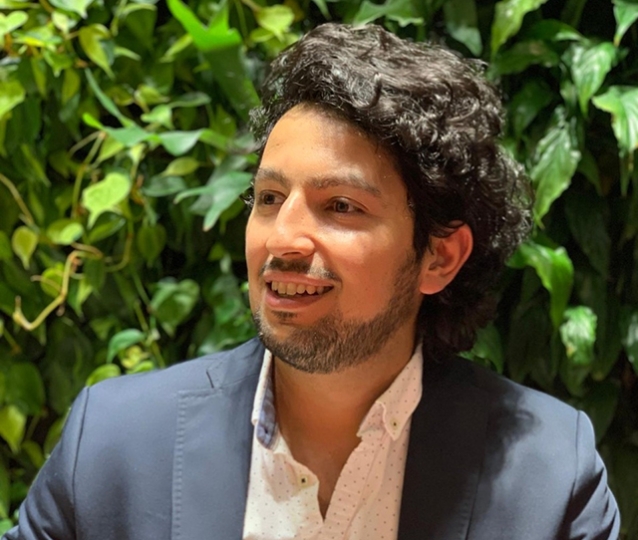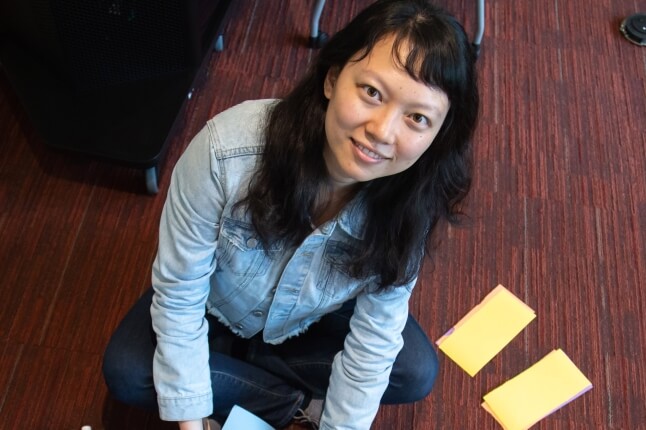News
Harvard postdoctoral fellow Javier Farago Escobar founded BiomassTrust, a startup that has patented a process that removes chlorine from Brazilian eucalyptus wood pellets. (Photo courtesy of Javier Farago Escobar)
When people think of renewable energy, solar panels or windmills are often the first images that come to mind. Yet half of global renewable energy comes from sustainable bioenergy, according to energy policy think tank REN21.
More than 60 percent of that sustainable bioenergy is produced by burning wood pellets, but their potential as a renewable energy source remains limited. Pellets generated from vast, tropical eucalyptus forests are banned in many countries because burning them generates hazardous emissions.
Enter BiomassTrust, a startup founded by Harvard postdoctoral fellow Javier Farago Escobar that has patented a process that removes chlorine from Brazilian eucalyptus wood pellets, enabling them to be used for fuel in hundreds of nations where they were previously barred.
“Brazil has the potential to produce more sustainable biomass than any country in the world,” Escobar said. “But currently many of the wood residuals in Brazil and other tropical countries, since they can’t sell this type of biomass, ends up being burnt in open fires or just abandoned.”
The chlorine in the wood only causes health hazards when it is burned, Escobar explained. Due to the increased speed with which rainclouds form in the humid tropics, more chlorine is deposited in wood than in a forest from a temperate climate.
Burning that tropical wood produces dioxin, a lethal chemical that can also corrode machinery in boilers or power plants.
Escobar developed an industrial-scale process that removes enough chlorine to make eucalyptus wood pellets safe for international markets. (Photo provided by Javier Farago Escobar)
Escobar has spent years studying this problem, first as a graduate student at the University of Sao Paulo and then as an environmental science and engineering postdoctoral fellow in the lab of Scot Martin, Gordon McKay Professor of Environmental Science and Engineering, at the Harvard John A. Paulson School of Engineering and Applied Sciences.
Escobar developed an industrial-scale procedure that involves mincing and grinding the biomass to a smaller size, then leaching the wood with deionized water, which removes enough chlorine to make the pellets safe for international markets.
The cost of Brazilian eucalyptus biomass treated using Escobar’s process is between $5 and $11 per ton, compared to $32 to $37 per ton for biomass from temperate climates.
Opening tropical biomass to export markets in North America, Europe, and Asia could go a long way toward reducing the world’s dependence on fossil fuels, he said.
“We have a lot of options to reduce the use of fossil fuels, but when you are talking about solar or wind energy, it is intermittent. When you are using wood, or a biofuel made from wood, you can access the base energy. These are sources of non-intermittent renewable energy,” he said. “That makes wood pellets very important for combating climate change.”
Since filing a Brazilian patent, as well as a patent in the European Union and Vietnam late last year, Escobar has already sold 300 containers of pellets. His work has led to the world’s first certified eucalyptus wood pellet fuel.
Now working in the Harvard Innovation Labs, he and Martin are planning to demonstrate the feasibility of using sustainable tropical biomass through a project in partnership with the Harvard University Office for Sustainability.
With BiomassTrust, Escobar hopes to show how the use of sustainable wood pellets for energy could contribute to solving climate change. (Photo provided by Javier Farago Escobar)
In the pilot program, Escobar plans to incorporate sustainable wood pellets into several boilers and furnaces the University uses to heat buildings and generate energy. He hopes to show how the use of these pellets can enable a large institution to easily switch from fossil fuels to renewable energy.
He’s excited to see how this proof-of-concept plays out, and plans to use it as a case study as he builds his customer base. Escobar has already negotiated contracts with companies in the U.S., Europe, and Russia.
The biggest challenge he faces as he explores more markets for sustainable biomass is changing people’s mindsets about renewable energy.
“People tend to think of wood as a primitive type of energy. But I think that sometimes we underestimate the wisdom of nature and the basics of science,” he said. “While we are rushing to build more efficient batteries, we forget that nature already gives us wood, which acts like a natural battery. I’m really passionate about this work and I want to contribute to solving climate change.”
Topics: Entrepreneurship, Environment
Cutting-edge science delivered direct to your inbox.
Join the Harvard SEAS mailing list.
Scientist Profiles
Scot T. Martin
Gordon McKay Professor of Environmental Science and Engineering and Professor of Earth and Planetary Sciences
Press Contact
Adam Zewe | 617-496-5878 | azewe@seas.harvard.edu





